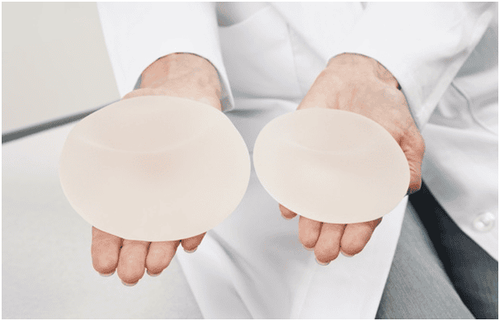This is an automatically translated article.
The article is professionally consulted by Master, Doctor Trinh Thi Thanh Huyen - Department of Obstetrics and Gynecology - Vinmec Hai Phong International General HospitalMost women with breast implants are able to breastfeed. The US CDC says that although studies are limited, there is no scientific evidence that women with breast augmentation should not breastfeed. There are however a few exceptions. Whether or not you can breastfeed may depend on the initial condition of your breasts before surgery and the type of surgery that was performed.
1. Breast augmentation mothers should breastfeed?
Breast implants can affect how much breast milk your body can produce. But in some cases, milk supply is not affected.
There will certainly be many mothers who worry that breastfeeding can affect the condition of their breasts. However, any change in breast shape and size during pregnancy and breastfeeding is normal.
For mothers who have had breast implant surgery, breastfeeding will not affect the breast that has undergone surgery, but the overall size and shape of the breasts may change.

Túi ngực có thể ảnh hưởng đến lượng sữa mẹ mà cơ thể có thể sản xuất
2. Effects of breast augmentation surgery on breastfeeding
Breast implants are usually placed behind the mammary gland or under the breast muscle, without affecting the milk supply. However, the location and depth of the incision can affect your ability to breastfeed.
Surgery to keep the areola intact causes less problems. The nerves around the nipple play an important role in breastfeeding. When the baby sucks, the feeling that the baby is sucking on the breast will increase the levels of the hormones prolactin and oxytocin. Prolactin stimulates the body to produce breast milk. When these nerves are damaged, this sensation is reduced and can affect the body's milk production.
Incisions made under the breast, through the armpit or navel are less likely to interfere with breastfeeding.
3. Is it safe to breastfeed with breast augmentation?
According to the US Centers for Disease Control and Prevention, there have not been any clinical reports of maternal or neonatal abnormalities by nursing mothers after breast augmentation surgery.
A 2007 study measured the concentration of silicon in breast milk and found no difference between mothers with breast augmentation and mothers without breast augmentation.
There is also no evidence of an increased risk of developing birth defects in babies born to mothers with breast implants. However, breast implants pose some risks, such as:
Possibility of additional surgery to correct or remove capsular contracture, which occurs when scar tissue forms around the implant causing squeezing Changes in sensation in breasts and nipples Breast pain Implant rupture

Việc cấy ghép ngực có thể gây ra tình trạng đau vú
4. Breastfeeding tips
There are a number of steps you can take to help increase your milk supply and help your baby get all the nutrients he needs.
4.1. Breastfeeding often Breastfeeding your baby 8 to 10 times a day can help keep your milk production regular. Breastfeeding stimulates the mother's body to produce milk. The more often you breastfeed, the more milk your body makes.
Even if the mother has little milk and the baby is only breastfed a little, it still provides the baby with a high amount of antibodies and extremely valuable nutrition. Breastfeeding from both breasts helps increase the mother's milk supply. The mother can feed the baby on one breast at a time and rotate. Breastfeeding experts recommend that mothers breastfeed their babies from one breast at a time so that babies receive complete and perfect nutrition through each feeding. The next feeding, the mother can switch to another breast.
4.2. Frequent Emptying Emptying plays an important role in milk production. Use a breast pump or express milk by hand after breastfeeding to increase milk production. A 2012 study found that pumping both breasts at the same time increased production and increased the calories and fat content of breast milk.
You can also express by hand or pump into a bottle to breastfeed if your baby refuses to suck at the breast.
4.3. Try lactation herbs There are a number of herbs that are believed to be a natural way to increase breast milk production, such as fenugreek leaves. In addition, mothers can also buy herbal lactation products at mother and baby stores. Please pay attention to choose reputable, quality products.
4.4. Make sure your baby latches on properly Proper latching is the key to helping your baby get the right amount of breast milk he needs with each feeding. Make sure your baby takes the breast completely in his mouth. Breastfeeding maneuvers are as follows:
Baby's mouth is wide open while feeding Baby latches on deep enough for baby's gums and tongue to cover mother's areola Start by choosing a position that's comfortable and suitable for both mother and baby. Baby: Your baby's head, back and bottom should be in a straight line. Then direct the baby towards the mother's nipple. Use your thumb and index finger to form a "C" position to adjust the breast to make it easier for the baby to latch on. You can also see a lactation consultant for guidance on the correct feeding position.

Khớp ngậm vú đúng chính là chìa khóa giúp bé nhận được đủ lượng sữa mẹ theo nhu cầu của bé qua mỗi cữ bú.
5. Add formula milk
If you have too little milk and feel like you can't meet your baby's needs, you can talk to your pediatrician about breastfeeding while adding formula
Signs that your baby is getting enough milk Milk includes:
Feeding slowly and steadily, deep jaw movements when sucking on milk 6 wet diapers and 3 or more dirty diapers (after each bowel movement) per day Stool changes from black to yellow meconium, flowers cauliflower Your baby's weight is another indicator that helps you measure whether you are providing enough milk for your baby or not. Most babies lose 7 to 10 percent of their weight within the first two to four days after birth, before they start to gain weight again. Talk to your child's pediatrician if you're concerned about your low milk supply or your baby's weight gain.
Newborns in general are prone to respiratory diseases, gastrointestinal infections if they eat solids early or the storage and preparation of milk is not guaranteed. To protect children's health, parents should do well to exclusively breastfeed their babies for the first 6 months (if possible) and vaccinate on schedule. As soon as a child shows symptoms such as anorexia, fatigue, and crying, the child needs to go to the hospital to be consulted by a specialist for monitoring and treatment. The pediatric department at Vinmec International General Hospital is the address for receiving and examining diseases that infants and young children are susceptible to: viral fever, bacterial fever, otitis media, pneumonia in children. With a system of facilities, modern medical equipment, sterile space, minimizing the impact as well as the risk of disease spread, Vinmec will bring satisfaction to customers. and is highly appreciated by industry experts with:
Gathering a team of leading pediatricians: including leading experts with high professional qualifications (professors, associate professors, doctors, Master's degree), experienced, worked at major hospitals such as Bach Mai, 108.. The doctors are all well-trained, professional, conscientious, knowledgeable about young psychology. In addition to domestic pediatric specialists, the Department of Pediatrics also has the participation of foreign experts (Japan, Singapore, Australia, USA) who are always pioneers in applying the latest and most effective treatment regimens. . Comprehensive services: In the field of Pediatrics, Vinmec provides a series of continuous medical examination and treatment services from Newborn to Pediatric and Vaccine,... according to international standards to help parents take care of their baby's health from birth to childhood. Advanced techniques: Vinmec has successfully deployed many specialized techniques to make the treatment of difficult diseases in pediatrics more effective: neurosurgery - skull, stem cell transplant blood in cancer treatment. Professional care: In addition to understanding children's psychology, Vinmec also pays special attention to the children's play space, helping them to play comfortably and get used to the hospital's environment, cooperate in treatment, improve the efficiency of medical treatment.
Please dial HOTLINE for more information or register for an appointment HERE. Download MyVinmec app to make appointments faster and to manage your bookings easily.
References: cdc.gov, healthline.com
SEE MORE
5 common breastfeeding problems Mother's nutrition while breastfeeding How long does breast milk keep in the fridge?













